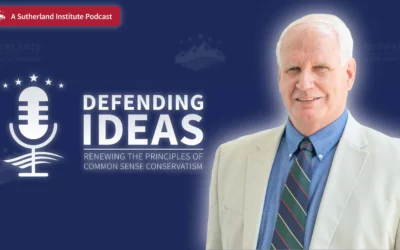
Written by Christine Cooke Fairbanks
September 23, 2020
“Primary documents are not partisan – they let all sides of the issue speak and really make students think through an idea rather than just reacting with a pre-made opinion,” says Dr. Jeffrey Sikkenga, executive director of the Ashbrook Center at Ashland University.
That’s what the Ashbrook program is all about: getting primary source documents of America’s founding into the classroom.
By training educators how to teach students to engage the founding documents themselves, Ashbrook shares the principles of freedom with upcoming generations. This is critical work in an age of turmoil and questions about America’s Founding.
Read our Q&A with Sikkenga below.
Christine Cooke, Sutherland Institute education policy fellow: What is at the heart of the current civil unrest, and how can education address it?
Sikkenga: We have a crisis in civic education that can no longer be ignored. We see the effects on the nightly news. It is true that too many Americans, especially young Americans, do not know the basic facts of our history and government. But the crisis is more than facts and information. It is really a crisis of understanding and devotion. Too many young people do not understand the principles of our founding or see America’s history as the story of our struggle to live up to those principles of freedom. If we teach young people that America’s history is, at its core, one of ugliness and oppression – they will never feel part of this country or be inspired by our struggle for freedom. You can’t love something ugly.
Instead, we need to help students discover the truth about America for themselves. Schools need to turn away from textbooks, which are boring or biased – or both. Schools need to bring American history alive by going back to the primary historical documents themselves like the Declaration of Independence and the Constitution. If students read the words of the Founders and those who followed after them, they can enter the world of those who lived the American story and understand the struggle for freedom.
Cooke: What is the mission of the Ashbrook program, and how does it seek to accomplish that mission?
Sikkenga: Ashbrook is in the freedom business. Our mission is to strengthen constitutional self-government by educating our fellow Americans in the history and founding principles of America, and in the habits of thinking and deliberation necessary to be self-governing citizens.
We run seminars and provide resources for teachers that run the entire scope of American history and civics. All of our programs are based on what we call the “Ashbrook way of teaching and learning.” It is based on seminar-style conversations led by university professors (good ones!) rooted in primary historical documents. Our aim is to reach the young through those who teach the young by equipping a core of teachers whose goal is not to just lecture at kids but to help their students discover the wonderful story of America for themselves.
Cooke: What are common pitfalls/misunderstandings that exist in civics education reform efforts today?
Sikkenga: Too often civics education is seen as a matter of imparting information or, worse still, indoctrination. Classes are too often forced to use textbooks that are boring or biased – or both. Instead of slowing down and digging deep into the fundamental principles of equality and liberty that animate the great documents, events, and debates of our history, classes are forced to race through the material without really learning it. They might memorize the “what” of American history and civics, but they never learn the “why.”
Cooke: Let’s speak to the teachers. How do teachers navigate the balancing act of preparing students for citizenship/civic engagement without getting tangled up inappropriately in politics in the classroom?
Sikkenga: There are great teachers around the country doing just that in the classroom. We work with thousands of them. They go back to the primary documents, read them carefully with their students, raise questions from them, and spark discussion. Primary documents are not partisan – they let all sides of the issue speak and really make students think through an idea rather than just reacting with a pre-made opinion. I think many of us have had a great teacher at one time whose classroom felt like a place of discovery. These teachers know their subject, love their subject, and love teaching students. They don’t inform; they don’t indoctrinate; they help students pursue the truth for themselves. Ashbrook cultivates and supports these teachers, and our network has grown to over 29,000 teachers.
Cooke: Is there hope to improve civic understanding and engagement? If so, where can those on both the right and left ends of the political spectrum agree?
Sikkenga: There is hope. We see great conversations every day in classrooms around the country being led by Ashbrook teachers. But we need to understand that civic engagement must be rooted in civic understanding. You can’t be a truly self-governing citizen of America unless you know something of what it means to be an American – of the fundamental principles and history that make us Americans.
The good news is that kind of education can take place if we reach teachers with the right kind of programs and resources. That’s our mission at Ashbrook. And it has a great effect. I recently got an email from a professor who led one of our teacher programs on the Early American Republic. He said that during our afternoon session today, he was talking about how Thomas Jefferson and John Adams both died on July 4, 1826. According to him, one of the teachers chimed in and she was crying. She said that she had been so upset about things she’d been seeing and hearing on the news but that our class on the Early Republic, another deeply divided time, had restored her faith in America’s prospects for long-term success. Then another student, who was also choked up, said that he sometimes questioned whether he had made the right choice to become a teacher but that now he felt convinced that he was “in exactly the right place.” That’s what can happen when we go back and study the fundamental documents and ideas that we share as Americans.
More Insights
Read More
Protecting property rights against government overreach
While governments can continue to regulate land use, these regulations and fees must be justified by a government interest and proportional to the effect of the development’s impact on that interest.
Do we need to care about the Utah State Board of Education?
For any Utah voters who also feel like K-12 public education is headed in the wrong direction, learning about the candidates running for a seat on the Utah State Board of Education (USBE) is a wise choice this election season.
Defending education choice the right way
Education choice has exploded in popularity across the nation in recent years. So why does it remain a contentious point of debate in some parts of the country?



